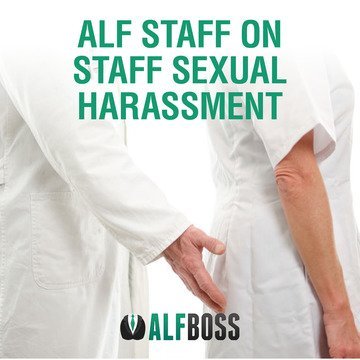
Working in the healthcare sector is presumably one of the most complex professions in the country. This is, predominantly, due to the fact that being able to efficiently combine their objective knowledge with subjective deduction (in dealing with cases) is an impressive feat –which makes healthcare workers stand out as professionals. This ability is therefore, mandatory among individuals who work in assisted living facilities, as they are expected to be professional and technical while ensuring that the care and services provided are personalized to the resident’s individual needs and medical requirements.
However, despite this ability and professionalism, there are several factors which hinder the care providers from being able to fully carry out their duties (without infringement and oppression). The most common factor, according to studies, is sexual harassment at the place of work. Although, a significant number of cases are related to sexual harassment from staff to resident, it is imperative that we take cognizance of staff to staff harassment, in line with the federal regulation.
According to RAINN (Rape, Abuse & Incest National Network), sexual harassment includes unwelcome sexual advances, requests for sexual favors, and other verbal or physical harassment of a sexual nature. This illustrates the context of sexual harassment as it relates in any, and every, scenario –including the workplace, as the history of corporate sexual harassment dates as far back as the origin of work itself.
The Florida Statutes provides that sexual harassment is a form of discrimination. According to Section 110.1221 of the Florida Statutes, it is the policy of the state that sexual harassment is a form of discrimination. The department shall adopt uniform sexual harassment rules applicable to all executive agencies. The rules must define the term “sexual harassment” in a manner consistent with the federal definition.
The incidence of sexual harassment from staff to staff in assisted living facilities creates a hostile working environment and there are laws that regulate assisted living facilities in Florida to ensure all appropriate standards are met, with the inclusion of a safe working environment for all staff. Therefore, it is important that management and administrative bodies of Assisted Living Facilities create policies tailored in line with the regulation of the United States of America regarding sexual harassment in the workplace (healthcare sector).
This policy should be set up to protect the members of staff as well as the facility. The indicated codes of conduct among employees will prevent incidence of sexual harassment, and if any, appropriate reprimand can be executed. Also, sexual harassment cases can affect the standing of the facility within the healthcare community, as well as expose them to lawsuit from the victim of the abuse/harassment. An existing policy will then, help to avoid the incidence of such cases or legal battles.
Prior to a policy against sexual harassment, the management of the assisted living facility should also mandate training for all employees to include: Assisted Living Facility (ALF) Florida state laws and regulations, and Proper response to Sexual Harassment and Abuse.
The management is also expected to mandate an ‘open door’ policy for staff and residents, ensuring that when cases are reported, they are handled with all seriousness and urgency, as well as proper investigation. It should also be publicized in the facility that sexual abuse falls under mandatory reporting requirements, and perpetrators will be punished according to Florida state laws.
The State of Florida Sexual Harassment Awareness Training document provides adequate information on the nature, context(s), complaint and reprimand procedures, laws and regulations regarding sexual harassment cases in the workplace. This document also provides an acknowledgement form for training of workers.
It is available for download here.